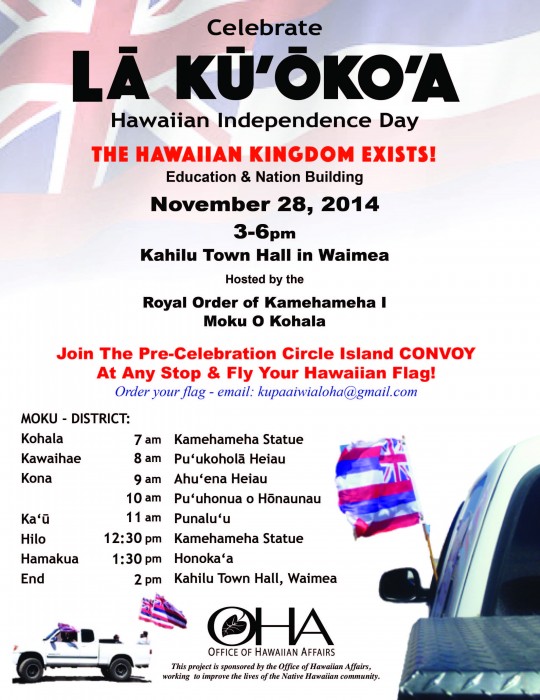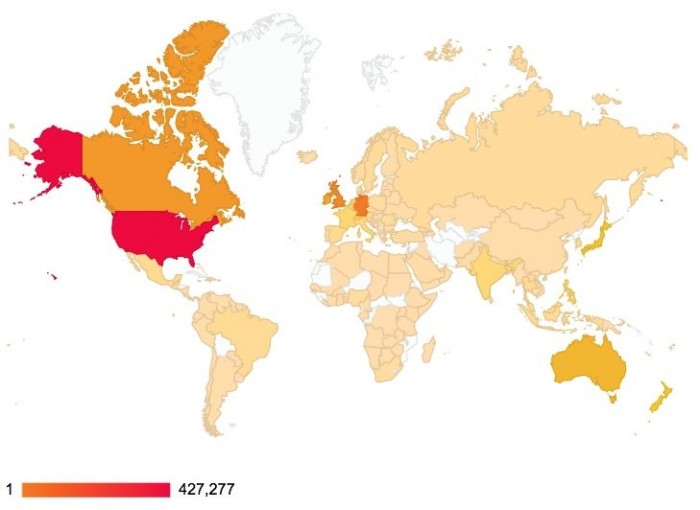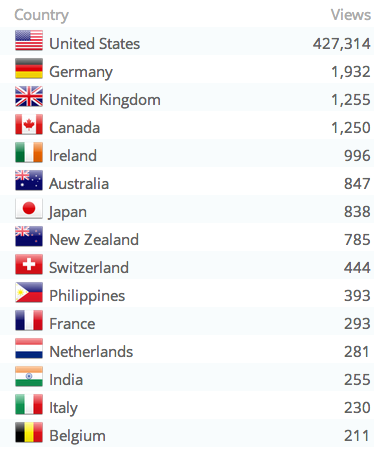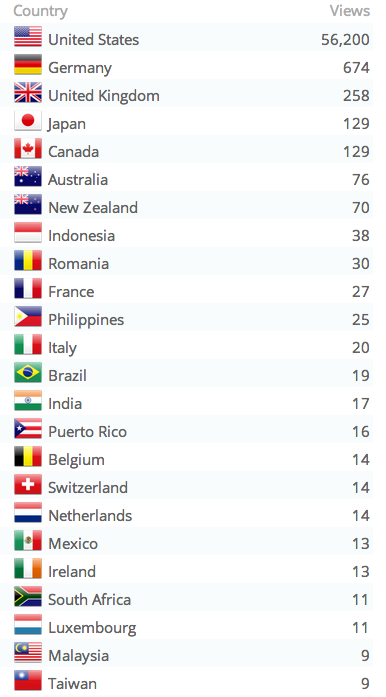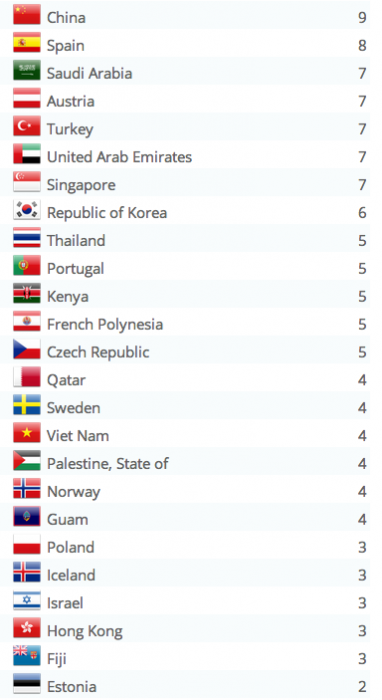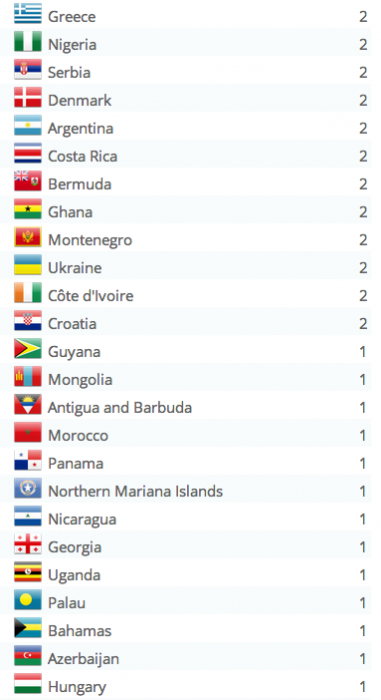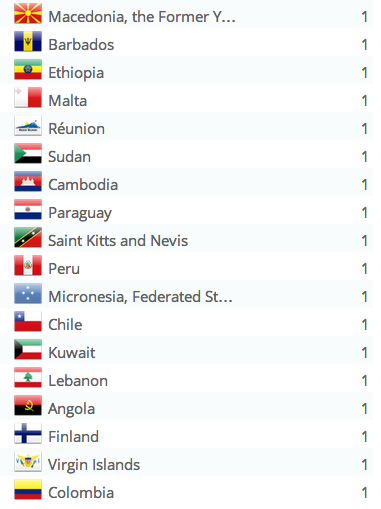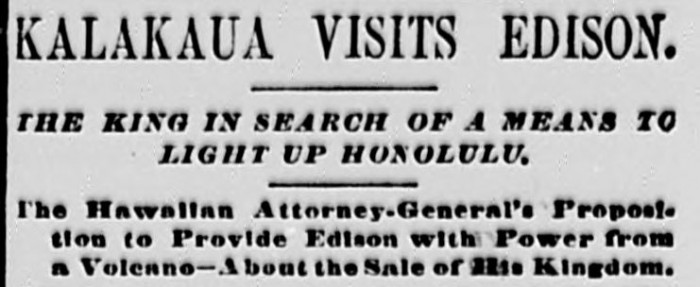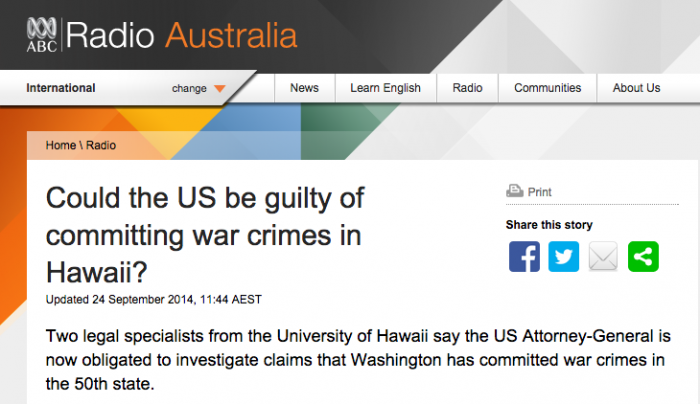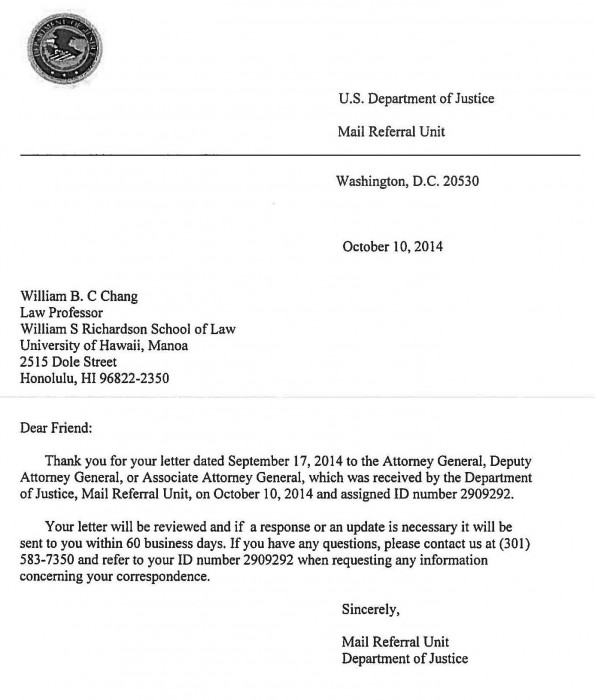Monthly Archives: October 2014
U.S. Congressman Clark Says Annexation Against the Will of the Hawaiian People
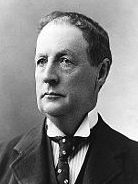 After the defeat of the Spanish Pacific Squadron in the Philippines on May 1, 1898, just one month into the Spanish-American War, Congressman Francis Newlands (D-Nevada), submitted House resolution no. 259 for the annexation of the Hawaiian Islands to the
After the defeat of the Spanish Pacific Squadron in the Philippines on May 1, 1898, just one month into the Spanish-American War, Congressman Francis Newlands (D-Nevada), submitted House resolution no. 259 for the annexation of the Hawaiian Islands to the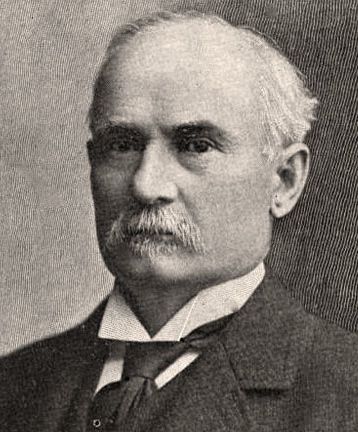 House Committee on Foreign Affairs on May 4, 1898. Six days later, hearings were held on the Newlands resolution, and on May 17, 1898, Chairman Robert Hitt (R-Illinois) reported the Newlands resolution out of the Committee of Foreign Affairs, and debates ensued in the House of Representatives until the resolution was passed on June 15, 1898.
House Committee on Foreign Affairs on May 4, 1898. Six days later, hearings were held on the Newlands resolution, and on May 17, 1898, Chairman Robert Hitt (R-Illinois) reported the Newlands resolution out of the Committee of Foreign Affairs, and debates ensued in the House of Representatives until the resolution was passed on June 15, 1898.
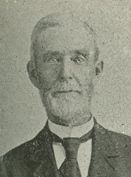 On June 11, 1898, Congressman Hitt began the debate by giving a lengthy testimony calling for the annexation of the Hawaiian Islands as a military necessity. One of the opponents to the scheme of annexation was Congressman Charles Nelson Clark (R-Missouri). He too gave a lengthy testimony on the floor of the House during the debate and one of his key points centered on the lack of support the so-called Republic of Hawai‘i had from the people of the Hawaiian Islands. He was making specific reference to the signature petition against the treaty of annexation by the Hawaiian Patriotic League that was submitted by Senator George Hoar (R-Massachusetts) after meeting with the officers of the league in Washington, D.C. This signature petition was a major reason why the Senate failed to acquire the necessary two-thirds vote to ratify a treaty of annexation that was signed by the McKinley administration and the so-called Republic of Hawai‘i. The treaty failed.
On June 11, 1898, Congressman Hitt began the debate by giving a lengthy testimony calling for the annexation of the Hawaiian Islands as a military necessity. One of the opponents to the scheme of annexation was Congressman Charles Nelson Clark (R-Missouri). He too gave a lengthy testimony on the floor of the House during the debate and one of his key points centered on the lack of support the so-called Republic of Hawai‘i had from the people of the Hawaiian Islands. He was making specific reference to the signature petition against the treaty of annexation by the Hawaiian Patriotic League that was submitted by Senator George Hoar (R-Massachusetts) after meeting with the officers of the league in Washington, D.C. This signature petition was a major reason why the Senate failed to acquire the necessary two-thirds vote to ratify a treaty of annexation that was signed by the McKinley administration and the so-called Republic of Hawai‘i. The treaty failed.
Here follows Congressman Clark’s testimony during the debate on June 11, 1898 (vol. 31, Congressional Record, p. 5793):
*******************************************************
AGAINST THE WILL OF THE HAWAIIAN PEOPLE
The cornerstone of this Republic is the proposition enunciated by Thomas Jefferson, the chief priest, apostle, and prophet of constitutional liberty—“Governments derive their just powers from the consent of the governed.”
If that proposition is not true, then the American Revolution was a monstrous crime; Washington, Warren, Montgomery, Greene, Marion, and all that band of heroes were turbulent traitors to King George III; John Hancock, Old John Adams, Patrick Henry, Richard Henry Lee, and their Congressional compeers pestilent disturbers of the peace; and all the blood shed in our two wars with Great Britain was wanton and wicked waste. If that proposition is not true, William McKinley is this day exercising functions usurped from Victoria Guelph, and this body is composed of mouthy brawlers doing unlawfully those things which the English House of Commons has the sole right to do.
If that proposition is not true, you, Mr. Speaker, are not Speaker de jure, but only Speaker de facto, interfering pro tanto with the prerogatives of the speaker of the English House of Commons, Mr. Gully, who is the grandson of a professional pugilist. [Laughter and applause.]
This annexation scheme is in flagrant violation of that basic principle of our Republic, for many thousand Hawaiians—more than the entire male adult population—have solemnly protested against the sale and delivery of their country to us by a little gang of adventurers who, claiming to be the whole thing, are offering to us a property of which they have robbed the rightful owners. And now America, which has been solemnly declared by the Supreme Court to be a Christian land, is to be made the receiver of these stolen Hawaiian goods.
If an ordinary citizen receives stolen goods, he commits a penitentiary offense. Wherein, I beg leave to inquire, is the difference of principle between in stealing ordinary property and in stealing an island or a group of islands, or in receiving them after they are stolen? The only justification lies in the thievish theory that if the theft is big enough, it ceases to be a crime and takes on the character and complexion of a virtue, and the perpetrators thereof, instead of being consigned to the striped uniforms, cramped quarters, meager diet, and hard labor of felons, are to be hailed as statesmen and rewarded with the plaudits of a grateful people—a theory which, I regret to say, is growing in this country.
But the jingoes tell us that this protest of the Hawaiians is all bogus, gotten up by designing knaves, and that the Hawaiians are falling over each other in their eagerness for annexation. If this is true, why not submit this annexation scheme to a popular vote in Hawaii, as was done in the case of Texas, and which was provided for in the treaty once negotiated with Santo Domingo, but which happily was never ratified, or have a plebiscite, as Napoleon III was in the habit of doing whenever he felt like it or wished to cure himself of ennui produced by wearing his uncle’s heavy crown, which was too large for him? That would be fair and would remove one difficulty. Certainly Mr. Sanford B. Dole could guarantee that every vote in favor of annexation would be counted at least once.
Does he or do his sponsors here shrink from the test of Hawaiian manhood suffrage on that proposition?
If a fair election on that proposition can not be had, what assurance have we that fair elections can be had hereafter, if we annex these islands? If the Hawaiians are not fit to vote on a proposition of vital interest to themselves, who will have the effrontery to say that they are fit to vote for all coming time on propositions of vital interest to us and to our posterity?
If governments derive their just powers from the consent of the governed, how does it happen that the Hawaiians are to have no voice in a performance which transforms their country from an independent nation into a mere outpost of this Republic?
Let him answer who can.
This submission to a vote of the Hawaiian male adults of a proposition decisive of their destiny ought to be insisted on by Congress as a condition precedent to even considering annexation.
This is the American method of procedure—a method bottomed on the eternal principles of wisdom, justice, and liberty.
We should demand a free ballot and a fair count for the Hawaiians, whose patrimony has been appropriated by President Dole and his partners in the oligarchy.
The annexation shouters claim that the Hawaiian names appended to the remonstrance are largely fictitious, and chiefly secured as signers under false pretenses. We deny it. Issue is squarely joined on an important matter of fact. It can be settled by a vote of the Hawaiian males over 21 years of age. Who can deny that that is a fair test?
All the machinery of elections is in the hands of the little coterie of oligarchists. They are able, resolute, ambitious men. They can be relied upon to see to it that every annexation voter votes and that his vote is counted. They can also be relied on to see to it that not an unlawful vote is cast against the scheme of annexation, for their fortunes depend upon annexation. Can anything be more clearly just? Is President Dole afraid of the verdict of his own people? I pause for a reply.
None of his friends answer, so I will answer myself. He can not be induced to submit this scheme to a popular manhood suffrage vote, for the very good reason that he knows that he and his friends hold office through usurpation and that the vast majority of the Hawaiian people are bitterly opposed to him and all his works. He the friend of liberty, is he? How does it happen, then, that while under the monarchy 14,000 persons were permitted to vote, only 2,800 are given the elective franchise under the oligarchy?
Let it be remembered also that a large percentage of these 2,800 voters have been colonized in Hawaii by Dole & Co. since they have been conducting the Government. What a misleading misnomer is it to dignify this little handful of close-corporation oligarchists with the name of a republic! What a burlesque upon truth, what a travesty upon justice, what an affront to intelligence to assert that Dole and his gang have any claims upon us or upon any other friends of representative government and human freedom!
Oh, yes, but we are told that all male citizens of the Sandwich Islands can vote who will swear that they will support the present Republic and the present constitution of Hawaii. Now, at first blush that seems perfectly fair; but it is a delusion and a snare, as will readily appear from this fact: The constitution, which the Hawaiian people never had any hand in adopting, provides for this very scheme of annexation, which the Hawaiian people detest. That condition for voting is a very skillful contrivance. It exhausted human ingenuity to invent it as is worthy of Machiavelli himself. In order to vote at all a citizen of the Sandwich Islands must solemnly swear to support a constitution which deprives his country of its nationality. What man who has any reputation to lose indorses such a swindle on a feeble people? Under it only about 2,800 persons to vote, and that is about the number in favor of annexation.
Canadian Television Airs Episode – Hawai‘i
176 Countries Visiting Hawaiian Kingdom Blog
Since the Hawaiian Kingdom blog was launched in August 2012 there has been nearly half a million hits from 176 countries, which includes non-self-governing territories, e.g. French Polynesia, Guam, American Samoa, Macao, Hong Kong and the Northern Mariana Islands. The largest number of visits come from the United States at 427,227, followed by Germany at 1,932, and the United Kingdom at 1,255.
The highest number of visits on a single day was 5,709 on May 11, 2014, and the blog has averaged 2,500 visits per day. For the past 30 days there has been a total of 57,776 visits from the following countries.
Comprehensive Plan to Transition from Illegal Regime to Military Government
The United States has had its footprint in the Hawaiian Kingdom since U.S. troops unlawfully landed on Hawaiian territory on January 16, 1893, in order to secure protection for a puppet government, calling themselves the Committee of Safety. The puppet government was created by the U.S. diplomat John Stevens. The following day, Stevens extended de facto recognition to this small group of roughly 30 individuals calling themselves the provisional government and ordered the U.S. troops to protect them from arrest by the Hawaiian police force for treason. Their stated purpose was to seek annexation to the United States.
A treaty of annexation was signed in Washington, D.C. between the insurgency and President Benjamin Harrison on February 14, 1893 and submitted to the U.S. Senate for ratification. On March 4th, President Grover Cleveland replaced Harrison and after receiving a diplomatic protest from Queen Lili’uokalani on the 9th he removed the treaty from the Senate and initiated a presidential investigation into the overthrow of the Hawaiian Kingdom government. His investigator, James Blount, who was the former Chairman of the House Committee on Foreign Affairs, reported “The American minister and the revolutionary leaders had determined on annexation to the United States, and had agreed on the part each was to act to the very end.” The investigation was completed on December 18, 1893 and determined the United States was responsible for the unlawful overthrow of a friendly government.
Negotiations took place between the Queen and the President’s diplomat, Albert Willis, in Honolulu beginning on November 13, 1893, and an agreement was reached on December 18th that obligated the United States to reinstate the Queen in her constitutional authority and thereafter the Queen to grant a pardon to the insurgents. This agreement, which under international law is a treaty, was not carried out. This allowed the illegal regime to hire American mercenaries in order continue to intimidate and coerce government officials in the executive and judicial branches of the Hawaiian government to sign oaths of allegiance. This illegal regime changed its name to the so-called Republic of Hawai‘i on July 4, 1894.
On August 12, 1898, the United States disguised the military occupation during the Spanish-American War as if Hawai‘i ceded its territory and sovereignty by a treaty. There is no treaty. According to Marek’s Identity and Continuity of States in Public International Law, p. 110, “a disguised annexation aimed at destroying the independence of the occupied State, represents a clear violation of the rule preserving the continuity of the occupied State.”
The regime’s name has since been changed to the Territory of Hawai‘i in 1900 and then to the State of Hawai‘i in 1959. For the past 121 years the United States footprint has never left the islands and because of its deliberate failure to administer the laws of the Hawaiian Kingdom through its illegal regimes since 1893 it has created a state of emergency that called for a comprehensive plan for transition from an illegal regime to a military government before the occupation can come to an end.
When a State is illegally occupying territory and has established an illegal regime, all official acts of the occupying State are null and void except for the registration of births, marriages and deaths. This is referred to as the Namibia exception, which was formulated by the International Court of Justice (ICJ) during the existence of an illegal regime established by South Africa when it unlawfully occupied Namibia. Examples of official acts include, but are not limited to, the function of notaries, registration of land titles, decisions by judicial and administrative courts, enactment of laws, licensing, etc. In his comment on the Namibia exception, the United Nations Secretary General noted that the determination of any legal validity of South Africa’s illegal presence would be the prerogative of the Namibian Legislative Assembly.
When a country’s territory is occupied by a foreign State, acts of a political nature are suspended throughout the duration of the occupation, which includes the right to vote. And when neutral territory is occupied by a belligerent State, the 1907 Hague Convention IV is not applied in its entirety. According Takahashi’s International Law Applied to the Russo-Japanese War, p. 251, and acknowledged by the U.S. Army Judge Advocate General (JAG) School’s Text no. 11, Law of Belligerent Occupation, p. 4, the only sections of the Hague Convention IV that apply to neutral territory under occupation by a belligerent State are:
Article 42—on the elements and sphere of military occupation;
Article 43—on the duty of the occupant to respect the laws in force in the country;
Article 46—concerning family honour and rights, the lives of individuals and their private property as well as their religious convictions and the right of public worship;
Article 47—on prohibiting pillage;
Article 49—on collecting the taxes;
Article 50—on collective penalty, pecuniary or otherwise;
Article 51—on collecting contributions;
Article 53—concerning properties belonging to the state or private individuals, which may be useful in military operations;
Article 54—on material coming from neutral states; and
Article 56—on the protection of establishments consecrated to religious, warship, charity, etc.
The occupant State’s “authority may be exercised in every field of government activity, executive, administrative, legislative and judicial,” as stated in the JAG’s Law of Belligerent Occupation, p. 38. “The occupant’s laws and regulations which find justification in military necessity or in his duty to maintain law and safety are legitimate under international law. Conversely, the acts of the occupant which have no reasonable relation to military necessity or the maintenance of order and safety are illegitimate.”
The United States use of illegal regimes to further entrench the disguised occupation of the Hawaiian Kingdom is a direct violation of the laws of occupation and general international law. As such, it has drawn to the forefront the Namibia exception with regard to these violations, which renders every executive, administrative, legislative and judicial acts done by these regimes since January 17, 1893 to be invalid and void except for the registration of births, marriages and deaths. As the national and international communities are becoming aware of the profound legal and economic ramifications of the United States’ failure to abide by international law, the situation in the Hawaiian Kingdom is cataclysmic.
In response to a course heading to unrivaled calamity for the country and the world at large, the acting Council of Regency could find no other recourse but to decree provisional laws for the Hawaiian Kingdom on October 10, 2014 in light of the United States’ violation of international law and the law of occupation for the past 121 years. Included in the decree of provisional laws are those laws having emanated from the Hawaiian legislatures that were convened under the so-called Bayonet Constitution of July 6, 1887, which was the beginning of the insurgency. This so-called constitution was not proclaimed in accordance with Hawaiian constitutional law.
For a detailed analysis of the formation of the acting Council of Regency under the doctrine of necessity download “The Continuity of the Hawaiian State and the Legitimacy of the acting Government of the Hawaiian Kingdom.”
As a result of an effective American occupation, the acting Council of Regency does not have the capacity or the ability to enforce the provisional laws proclaimed under the doctrine of necessity. It is the United States that must carry this out. Failure to do so would only lead to economic ruination for not only the United States, but also for the Hawaiian Kingdom and its citizenry, being the victims of these egregious and criminal violations.
This is analogous to the United States having stepped on a land mine called Hawai‘i’s sovereignty on January 16, 1893. That foot has not moved since then, and for the United States to remove its foot from this land mine and begin to comply with the international laws of occupation would consequently admit to the illegality of 121 years and the land mine would blow up legally and economically. That explosion would not only severely injure the United States, but it could also do the same to the Hawaiian Kingdom and everyone residing in these Islands to include those who are legally and economically tied to these islands who live abroad. What’s needed is a means by which the weight of the United States as a government could be replaced by an equal weight so that the land mine can be disarmed. Only a government could do such a thing, and in this case it could only be done by the acting Government of the Hawaiian Kingdom, which itself was established in 1997 by the doctrine of necessity. The decree of provisional laws is this equal weight needed in order for the United States to remove its foot and begin to administer the laws of the occupied State according to the 1907 Hague Convention IV and the 1949 Geneva Convention IV.
The decree of provisional laws is a practical and comprehensive plan for transition from an illegal regime to a military government that relies on international law, which includes treaties, international customs, general principles of law recognized around the world, the decisions of international courts, scholarly writing, and the laws of the Hawaiian Kingdom. It is not intended to end the occupation, but rather to bring compliance to the laws of occupation. It is the responsibility of the acting government to ensure implementation of these provisional laws by any and all lawful means.
A State of War Between Hawai‘i and the United States Now at 121 years
Under international law, war does not only apply to belligerent States, but also applies to neutral States whose territories have been invaded and occupied by one of the belligerents in its course of war with the other belligerent. According to Oppenheim’s International Law (7th ed.), p. 685, “hostilities against a neutral [State] on the part of either belligerent are acts of war, and not mere violations of neutrality. Thus the German attack on Belgium in 1914, to enable German troops to march through Belgian territory and attack France, created war between Germany and Belgium.” While Belgium was occupied by Germany from 1914-1918, Belgium was, for the purposes of international law, also at war with Germany during the occupation.
By the 1839 Treaty of London, Great Britain, Austria, France, the German Confederation, Russia, and the Netherlands recognized Belgium as an independent and perpetual neutral State. Under international law, a neutral State cannot wage war but is limited to the defense of its territory. During World War I, Belgium’s neutrality was violated by Germany in its war against France.
When “neutral territory becomes the region and theatre of war, and is militarily occupied by a belligerent, the occupant does not possess such a wide range of rights with regard to the occupied country and its inhabitants as he possesses in occupied enemy territory,” states Oppenheim, p. 241. “He can indeed resort to all measures which are necessary for the safety of his forces; but he cannot exact contributions or appropriate cash, funds, and realizable securities which are the property of the neutral State.”
Like Belgium, the Hawaiian Kingdom was a neutral State explicitly recognized in its treaties with Spain in 1863 and the Kingdom of Sweden and Norway in 1852. Article 26 of the Hawaiian-Spanish treaty, states “All vessels bearing the flag of Spain, shall, in time of war, receive every possible protection, short of active hostility, within the ports and waters of the Hawaiian Islands, and Her Majesty the Queen of Spain engages to respect, in time of war the neutrality of the Hawaiian Islands.”
On April 25, 1898, war broke out between the United States and Spain, and fighting between the armed forces of both belligerents took place in the Spanish possessions of Guam and the Philippines in the Pacific Ocean, and Cuba and Puerto Rico in the Caribbean Ocean. The next month, United States naval convoys entered Honolulu harbor to re-coal their ships on their way to fighting in the Philippines. This action taken by the United States naval forces was a direct violation of Hawai‘i’s neutrality under the Hawaiian-Spanish Treaty, which prompted a formal protest by the Spanish Vice-Consul H. Renjes June 1, 1898.
The Spanish protest declared, “In my capacity as Vice Consul for Spain, I have the honor today to enter a formal protest with the Hawaiian Government against the constant violations of Neutrality in this harbor, while actual war exists between Spain and the United States of America.” The last battle was fought on August 13, 1898 when U.S. forces captured the city of Manila, and the war officially ended on December 10, 1898 when a treaty was signed in Paris.
As a result of United States intervention in 1893 and the subsequent creation of a puppet government, calling itself the provisional government and later renaming itself the Republic of Hawai‘i, the United States took complete advantage of its own creation in the islands during the Spanish-American War.
“Puppet governments are organs of the occupant and, as such form a part of his legal order,” explains Krystyna Marek in Identity and Continuity of States in Public International Law (2nd ed.), p. 114. “The agreements concluded by them with the occupant are not genuine international agreements, however correct in form; failing a genuine contracting party, such agreements are merely decrees of the occupant disguised as agreements which the occupant in fact concludes with himself. Their measures and laws are those of the occupant.”
According T.A. Bailey, whose article “The United States and Hawai‘i During the Spanish-American War” was published in The American Historical Review (1931), “The position of the United States was all the more reprehensible in that she was compelling a weak nation to violate international law that had to a large degree been formulated by her own stand on the Alabama claims. Furthermore, in line with the precedent established by the Geneva award, Hawaii would be liable for every cent of damage caused by her dereliction as a neutral, and for the United States to force her into this position was cowardly and ungrateful. At the end of the war, Spain or cooperating power would doubtless occupy Hawaii, indefinitely if not permanently, to insure payment of damages, with the consequent jeopardizing of the defenses of the Pacific Coast.”
Bailey’s reference to the Alabama claims was an international arbitration case between the United States and Great Britain in the city Geneva that centered on Britain’s violation of neutrality by building war ships for the Confederate States in America’s Civil War. One of these ships was called the C.S.S. Alabama. The arbitral tribunal concluded the British violated the international law of neutrality and had to compensate the United States $15.5 million dollars for all damages inflicted by the ships built in Great Britain.
“Although the [Hague] conventions expressly apply only to the occupation of hostile or enemy territory, …it is usually held that they apply also to the forceful occupation of neutral territory,” says Gerhard von Glahn in The Occupation of Enemy Territory, p. 12. “Thus provisions of the applicable articles should have been mandatory in their application to the German occupation of Denmark, Norway, and other countries neutral at the time of their invasion by the forces of the Third Reich.”
In 1893, President Grover Cleveland reported to the Congress ““on the 16th day of January, 1893, between four and five o’clock in the afternoon, a detachment of marines from the United States steamer Boston, with two pieces of artillery, landed at Honolulu. The men, upwards of 160 in all, were supplied with double cartridge belts filled with ammunition and with haversacks and canteens, and were accompanied by a hospital corps with stretchers and medical supplies. This military demonstration upon the soil of Honolulu was of itself an act of war, unless made either with the consent of the Government of Hawaii or for the bona fide purpose of protecting the imperiled lives and property of citizens of the United States. But there is no pretense of any such consent on the part of the Government of the Queen, which at that time was undisputed and was both the de facto and the de jure government.”
Failing to carry out the executive agreement of December 18, 1893 to reinstate the Hawaiian Kingdom government negotiated between U.S. Ambassador Albert Willis and Queen Lili‘uokalani, the United States allowed their puppet government calling itself the provisional government to remain in existence. On July 4, 1894, the name was changed to the Republic of Hawai‘i, then renamed to the Territory of Hawai‘i on April 30, 1900, and then the State of Hawai‘i on March 18, 1959.
Since the admitted “act of war” was committed by the United States on January 16, 1893, the Hawaiian Kingdom has been in a state of war with the United States now going on for 121 years. This is the longest state of war between States in the history of international law since the Thirty Years’ War that established international law as we know it today through the 1648 Treaty of Westphalia.
Despite the prolonged and illegal occupation of the Hawaiian Kingdom, international law provides for its continued existence, especially in light of its legal status as a neutral State, and the failure of the United States to comply with international law, the international laws of occupation and international humanitarian laws. The Proclamation of the acting Council of Regency provides the legal foundation for the United States’ compliance to international law in light of 121 years of violation.
Proclamation Decreeing Provisional Laws
On October 10, 2014, the acting Council of Regency has decreed, by Proclamation, provisional laws for the Kingdom that are subject to ratification by the Legislative Assembly, in order to provide the proper legal foundation for the United States administration of Hawaiian Kingdom laws in compliance with the international law of occupation (Article 43, 1907 Hague Convention IV). Since 1898, when the Hawaiian Kingdom was occupied during the Spanish-American War, the United States has violated international law by not administering the laws of the occupied State. This violation has consequently placed the Hawaiian Kingdom today into a state of emergency and a fragile state of economic ruination because currently all laws that are being followed in these islands are not laws at all because they emanate from unlawful legislatures since July 6, 1887, which was the beginning of the insurgency that led to the unlawful landing of U.S. troops on January 16, 1893, and other self-declared legislatures since, to include the provisional government (1893-1894), Republic of Hawai‘i (1894-1900), the Territory of Hawai‘i (1900-1959) and the State of Hawai‘i (1959-present).
PROCLAMATION
WHEREAS, the armed forces of the United States of America have invaded and occupied the shores of the Hawaiian Islands on two separate occasions, the first being from January 16, 1893 to April 1, 1893, and the second since August 12, 1898 to the present, whereby the latter being an illegal and prolonged occupation; and
WHEREAS, the armed forces of the United States of America on January 17, 1893 aided and abetted a small group of insurgents in seizing the Executive office of the Hawaiian Kingdom government and thereafter participated in the coercion of all government employees and officials in the executive and judicial branches of the government of the Hawaiian Kingdom to sign oaths of allegiance to the insurgency calling themselves the so-called provisional government; and
WHEREAS, United States President Grover Cleveland concluded, through a presidential investigation, that the overthrow of the Hawaiian Kingdom government was unlawful, and that the United States bears the sole responsibility for the overthrow of the government of a friendly State, and provide restitution; and
WHEREAS, executive mediation took place between United States Minister Plenipotentiary Albert Willis and Her Majesty Queen Lili‘uokalani beginning on November 13, 1893, at the United States Legation in the city of Honolulu, and on December 18, 1893 an agreement was reached through exchange of notes committing the United States to reinstate the government, and thereafter the Hawaiian Kingdom to grant amnesty to the insurgents; and
WHEREAS, United States President Cleveland and his successors in office failed to faithfully execute the agreement and allowed the insurgency to gain power through the hiring of American mercenaries in order to seek annexation to the United States of America; and
WHEREAS, during the Spanish-American War, the armed forces of the United States of America unlawfully invaded and occupied the Hawaiian Islands on August 12, 1898, being a neutral State, to wage war against the Spanish colonies of the Philippines and Guam in the Pacific Ocean; and
WHEREAS, since the second occupation, the armed forces of the United States of America have not complied with international law, the international laws of occupation, both customary and by conventions, and international humanitarian law; and
WHEREAS, the armed forces of the United States of America under the guise of civilian authority seized control of the government of the Hawaiian Kingdom calling itself the so-called Republic of Hawai‘i, being the successor to the provisional government, and renamed the same as the government of the Territory of Hawai‘i on April 30, 1900, and then subsequently renamed as the government of the State of Hawai‘i on March 18, 1959; and
WHEREAS, the so-called provisional government, the Republic of Hawai‘i, the Territory of Hawai‘i, and the State of Hawai‘i have no legal basis under Hawaiian Kingdom law or the international laws of occupation; and
WHEREAS, the occupant State has unlawfully levied pecuniary contributions of various kinds that included taxes and the imposition of fines in violation of international law; and
WHEREAS, the occupant State has unlawfully seized public and private property for the construction of its government agencies and military installations from the occupied State and its inhabitants, and that restoration and compensation shall be made under jus post liminii; and
WHEREAS, the failure of the armed forces of the United States of America to administer the laws of the Hawaiian Kingdom as it stood prior to the insurrection of July 6, 1887 has placed the Hawaiian Kingdom into a state of emergency that could lead to economic ruination and calamity; and
WHEREAS, war crimes have and continue to be committed as a result of the failure of the armed forces of the United States of America to administer the laws of the Hawaiian Kingdom in accordance with the 1907 Hague Regulations and the 1949 Geneva Convention IV; and
WHEREAS, customary international law recognizes that the rules on belligerent occupation will also apply where a belligerent State, in the course of war, occupies neutral territory, being the territory of the Hawaiian Kingdom; and
WHEREAS, customary international law recognizes that when neutral territory is militarily occupied by a belligerent, the occupant State does not possess a wide range of rights with regard to the occupied State and its inhabitants as it would in occupied enemy territory; and
WHEREAS, customary international law recognizes that legislative power remains with the government of the occupied State during military occupation of the occupied State’s territory; and
WHEREAS, Her late Majesty Queen Lili‘uokalani died on November 11, 1917, without an heir apparent proclaimed in accordance with Article 22 of the 1864 Constitution, as amended; and
WHEREAS, it is provided by Article 33 of the Constitution that should a Monarch die without confirming an heir apparent in accordance with Hawaiian law, the Cabinet Council shall serve as an acting Council of Regency who shall administer the Government in the name of the Monarch, and exercise all the Powers which are constitutionally vested in the Monarch, until the Legislative Assembly may be assembled to elect by ballot a de jure Regent or Council of Regency; and
WHEREAS, according to Article 42 of the Constitution, the Cabinet Council consists of the Minister of Foreign Affairs, the Minister of the Interior, the Minister of Finance and the Attorney General of the Kingdom; and
WHEREAS, an acting Regency, by virtue of the offices made vacant in the Cabinet Council, was established under the doctrine of necessity by proclamation on February 28, 1997, pursuant to Article 33 of the Constitution and possesses the constitutional authority to temporarily exercise the Royal Power of the Hawaiian Kingdom under Article 32; and
WHEREAS, the Legislative Assembly is unable to be assembled in accordance with Title 3—Of the Legislative Department, Civil Code of the Hawaiian Islands (Compiled Laws, 1884), in order to elect by ballot a de jure Regent or Council of Regency as a direct result of the prolonged occupation of the Hawaiian Kingdom by the armed forces of the United States of America and the Rules of Land Warfare of the United States; and
WHEREAS, the public safety requires:
NOW, THEREFORE, WE, the acting Council of Regency of the Hawaiian Kingdom, serving in the absence of the Monarch and temporarily exercising the Royal Power of the Kingdom, do hereby acknowledge that acts necessary to peace and good order among the citizenry and residents of the Hawaiian Kingdom, such for example, as acts sanctioning and protecting marriage and the domestic relations, governing the course of descents, regulating the conveyance and transfer of property, real and personal, and providing remedies for injuries to person and estate, and other similar acts, which would be valid if emanating from a lawful government, must be regarded in general as valid when proceeding from an actual, though unlawful government, but acts in furtherance or in support of rebellion or collaborating against the Hawaiian Kingdom, or intended to defeat the just rights of the citizenry and residents under the laws of the Hawaiian Kingdom, and other acts of like nature, must, in general, be regarded as invalid and void;
AND, WE do hereby proclaim that from the date of this proclamation all laws that have emanated from an unlawful legislature since the insurrection began on July 6, 1887 to the present, to include United States legislation, shall be the provisional laws of the Realm subject to ratification by the Legislative Assembly of the Hawaiian Kingdom once assembled, with the express proviso that these provisional laws do not run contrary to the express, reason and spirit of the laws of the Hawaiian Kingdom prior to July 6, 1887, the international laws of occupation and international humanitarian law, and if it be the case they shall be regarded as invalid and void;
AND, WE do hereby further proclaim that the currency of the United States shall be a legal tender at their nominal value in payment for all debts within this Kingdom pursuant to An Act To Regulate the Currency (1876);
AND, WE do hereby call upon the said Commander of the United States Pacific Command, and those subordinate military personnel to whom he may delegate such authority to seize control of our government, calling itself the State of Hawai‘i, by proclaiming the establishment of a military government, during the present prolonged military occupation and until the military occupation has ended, to exercise those powers allowable under the international laws of occupation and international humanitarian law;
AND, WE do require all persons, whether subjects of this kingdom, or citizens or subjects of any foreign State, while within the limits of this kingdom, to obey promptly and fully, in letter and in spirit, such proclamations, rules, regulations and orders, as the military government may issue during the present military occupation of the Hawaiian Kingdom so long as these proclamations, rules, regulations and orders are in compliance with the laws and provisional laws of the Hawaiian Kingdom, the international laws of occupation and international humanitarian law;
AND, WE do further require that all courts of the Hawaiian Kingdom, whether judicial or administrative, shall administer the provisional laws hereinbefore proclaimed forthwith;
AND, WE do further require that Consular agents of foreign States within the territory of the Hawaiian Kingdom shall comply with Article X, Chapter VIII, Title 2—Of the Administration of Government, Civil Code of the Hawaiian Islands (Compiled Laws, 1884) and the Law of Nations;
AND, WE do further require every person now holding any office of profit or emolument under the State of Hawai‘i and its Counties, being the Hawaiian government, take and subscribe the oath of allegiance in accordance with An Act to Provide for the Taking of the Oath of Allegiance by Persons in the employ of the Hawaiian Government (1874).
IN WITNESS WHEREOF, We have hereunto set our hand, and caused the Great Seal of the Kingdom to be affixed this 10th day of October A.D. 2014.
[SEAL]
David Keanu Sai, Ph.D.
Chairman of the acting Council of Regency
Acting Minister of the Interior
Peter Umialiloa Sai,
Acting Minister of Foreign Affairs
Kau‘i P. Sai-Dudoit,
Acting Minister of Finance
Dexter Ke‘eaumoku Ka‘iama, Esq.,
Acting Attorney General
King Kalakaua Visits Thomas Edison in New York City in 1881
The New York Sun newspaper on September 26, 1881 reported:
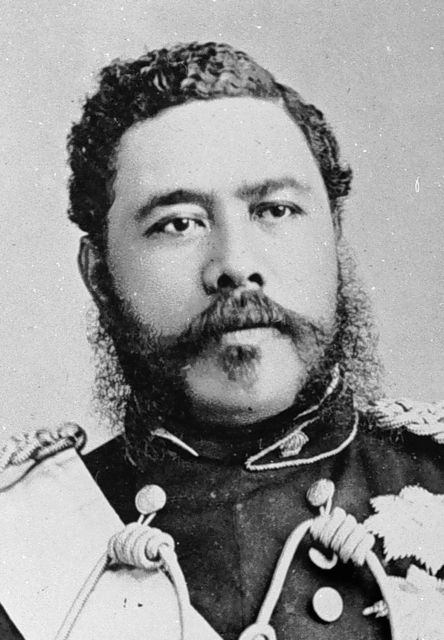 King Kalakaua was introduced to Mr. Thomas A. Edison at the latter’s headquarters, in Fifth avenue, at 9 o’clock last night. Mr. George Jones, the proprietor of the Times, met his Majesty in Vienna, and when the conversation turned upon the electric light, Mr. Jones promised to introduce the King to the electrician when met in New York. At 9 o’clock Mr. Edison was in an upper room at work. A half dozen friends and assistants were with him. The electric lights were burning throughout the building. A carriage rumbled up to the curb, and in an instant the King, Mr. Jones, Attorney General Armstrong, and one or two other entered. They were shown into a rear room, and as they stood there, looking at the chandelier, Edison came in. His hair was tousled in every direction. As he entered he ran his hand nervously through his hair, as if conscious that it was discorded, and thus made it worse. Mr. Jones introduced him to the King, and he nodded rather than bowed, at the same time extending one hand absent-mindedly, first at Mr. Jones and then at the monarch, who took it, and looked smilingly into the boyish face of the inventor.
King Kalakaua was introduced to Mr. Thomas A. Edison at the latter’s headquarters, in Fifth avenue, at 9 o’clock last night. Mr. George Jones, the proprietor of the Times, met his Majesty in Vienna, and when the conversation turned upon the electric light, Mr. Jones promised to introduce the King to the electrician when met in New York. At 9 o’clock Mr. Edison was in an upper room at work. A half dozen friends and assistants were with him. The electric lights were burning throughout the building. A carriage rumbled up to the curb, and in an instant the King, Mr. Jones, Attorney General Armstrong, and one or two other entered. They were shown into a rear room, and as they stood there, looking at the chandelier, Edison came in. His hair was tousled in every direction. As he entered he ran his hand nervously through his hair, as if conscious that it was discorded, and thus made it worse. Mr. Jones introduced him to the King, and he nodded rather than bowed, at the same time extending one hand absent-mindedly, first at Mr. Jones and then at the monarch, who took it, and looked smilingly into the boyish face of the inventor.
“I have heard about you, Mr. Edison,” said his Majesty, “and I have wished to see you and your wonderful inventions.”
The King has gained a decidedly English intonation since his last visit, and the melodious voice that he possesses, in common with the people of his kingdom, renders that intonation more than usually agreeable. He was dressed in black, relieved only by his white collar, the horseshoe of brilliant diamonds on his scarf, and his white cuffs.
 Edison exhibited his light, turning one burner up and down, and then putting all out at once and instantly relighting them. The King was interested. Attorney-General Armstrong says that his Majesty is especially interested in the electric light, because his capital, Honolulu, must be lighted soon by something superior to the kerosene now employed there. The monarch is undecided whether the new illuminator shall be gas or electricity, but has resolved to wait until electricity has had a full and practical trial. The King saw Edison’s representative in Paris and learned much from him. Last night there was an awkward pause after the King had complimented Edison and Edison had nodded back his thanks. Everybody felt a little uncomfortable. The King broke the spell by suddenly asking: “How do you produce those carbon arcs?”
Edison exhibited his light, turning one burner up and down, and then putting all out at once and instantly relighting them. The King was interested. Attorney-General Armstrong says that his Majesty is especially interested in the electric light, because his capital, Honolulu, must be lighted soon by something superior to the kerosene now employed there. The monarch is undecided whether the new illuminator shall be gas or electricity, but has resolved to wait until electricity has had a full and practical trial. The King saw Edison’s representative in Paris and learned much from him. Last night there was an awkward pause after the King had complimented Edison and Edison had nodded back his thanks. Everybody felt a little uncomfortable. The King broke the spell by suddenly asking: “How do you produce those carbon arcs?”
Instantly the electrician was at home, and he launched out into a description of his lamp, couched in homely language, and illustrated with bits of wire and portions of his apparatus. He and the King were left together, and the others stood apart. Presently some ladies came in softly, and, getting behind the others, saw royalty deferring to genius. Edison was so interested that he occasionally left the King’s side to correct what he heard others saying, and once he left his Majesty all alone, holding a picture and not knowing what to do with it. The King is a good listener and appeared to be interested. He asked practical and sensible questions. He was astonished to hear that Edison was going to sell power as well as light. He said he had not heard of that before. He was amazed at Edison’s maps of the business districts, peppered all over with dots, each of which represented a gas burner wherever there is a gas burner, and at other maps covered with parallelograms of varying sizes, representing the amount of horse power in use in the same localities.
“Can you lay your wires in submarine cables?” Attorney-General Armstrong asked.
“Well, it would cost so much, that’s all,” Edison replied.
“Because you might come over to the Sandwich Islands,” the King’s advisor said, “where we have a volcano that burns a thousand million tons of coal a day, and you could put your boilers on top of the volcano and get power enough to supply the country.”
“Is that where you get your coal?” Edison asked, overlooking the joke in his thirst for information.
“No; we get our coal from Australia,” said the Attorney-General,” but we build great hopes on that volcano. When we sell out we expect to get more for that than for anything we have got.”
At this the King laughed heartily. He went through the building with Edison and watched the inventor with unaffected curiosity. He was astonished to hear that the carbon horseshoes gradually became so hard by burning that they will cut glass like a diamond. The King suggested that this information would be prized by the ladies. Up stairs, where there is a burner over a compositor’s type case, the King was show a book to illustrate the steadiness and gentleness of the light. The conversation turned upon the Hawaiian language, which the Attorney-General told Edison was extremely soft and musical. Edison said he should like to hear it, and the King was prevailed upon to say something in Hawaiian. The King proved bashful. He hesitated a moment,
“I say to you,” he said, “Ho-e ke-low-a—that means ‘How are you?’”
“I know the words ‘Mauna Loa,’” Edison said.
“The language is full of the vowel sound,” said Gen. Armstrong, “It has only thirteen letters.”
“Twelve,” said the King.
“Twelve,” said Gen. Armstrong: “all the vowels and a few consonants.”
The King went with Edison down stairs to the engine room, and Edison showed him the dynamo machine and motor. After that the King thanked the inventor, said he had been greatly interested, shook hands with him, and, with Mr. Jones and the others, quitted the building.
In the morning the King and Lord High Chamberlain Judd had been to Irvington, where they spent the day with Mr. Mason, an old resident of the Sandwich Islands. They returned to the city in the evening. The King has received many calls at the Brunswick. The visitors have been mainly persons who have been in the Sandwich Islands or people whom he met on his travels. He has declined a number of social invitations out of respect to the national distress.
U.S. Department of Justice Acknowledges War Crimes Being Committed in Hawai‘i
Under the criminal code of the United States of America, Title 18 U.S.C. §4, provides for the reporting of felonies to federal authorities, whether civil or military, as a duty and not a choice. According to Black’s Law Dictionary (1996), a duty is defined as an obligation “to conform to legal standard of reasonable conduct in light of apparent risk.” A person who fails to report a felony as soon as possible risks being fined or face up to three years in prison, which is a felony as well. In other words, failure to report a felony is a felony.
On September 17, 2014, Professor Williamson Chang, senior law professor at the University of Hawai‘i William S. Richardson School of Law, reported the commission of war crimes to U.S. Attorney General Eric Holder at the U.S. Department of Justice (DOJ) in Washington, D.C. Professor Chang held a press conference on September 22, 2014 at the University of Hawai‘i in front of the William S. Richardson School of Law. Although American media in the United States and Hawai‘i were notified by press release of the press conference, none were present, and the press conference was covered by Kingdom Media Hawai‘i. The story was then picked up by ABC Australia news and radio and New Zealand’s radio The Wire. ABC Australia reported:
In his letter to the Attorney General, Professor Chang stated, “Pursuant to 18 U.S.C. §4—Misprision of felony, I am legally obligated to report to you the knowledge I have about multiple felonies that prima facie have been and continue to be committed here in the Hawaiian Islands. I have been made aware of these felonies through the memorandum by political scientist David Keanu Sai, Ph.D., who was contracted by the State of Hawai‘i Office of Hawaiian Affairs, entitled Memorandum for Ka Pouhana, CEO of the Office of Hawaiian Affairs regarding Hawai‘i as an Independent State and the Impacts it has on the Office of Hawaiian Affairs.” Professor Chang’s letter was endorsed with the signatures of seventeen other State of Hawai‘i officials and employees.
The U.S. Attorney General received Professor Chang’s reporting of war crimes on September 19, 2014 by FedEx courier under tracking number 8061 7191 0836.
“Further, as a State of Hawai‘i employee, I and other State officials and employees receive State monies that have been implicated as being gained through the commission of felonies, namely the war crime of pillaging,” stated Professor Chang. Under 18 U.S.C. §662, receiving stolen property is a felony punishable by a fine or up to three years in prison. Receiving stolen property has four elements that need to be met in order to be considered a crime: (1) the property must be received; (2) it must have been previously stolen; (3) the person receiving the property must know it was stolen; and (4) the receiver must intend to deprive the owner of his or her property.
Professor Chang’s reporting of war crimes, being felonies under 18 U.S.C. §2441, to the DOJ effectively placed a corresponding obligation upon the U.S. Attorney General to either initiate a criminal investigation into the reported felonies, or explicitly state that felonies have not been committed thereby removing the apparent risk of a fine or up to three years in prison under both §4—misprision of felony, and §662—receiving stolen property.
Professor Chang stated, “If your office’s response in two weeks is able to refute the evidence provided for in the Memo, then assuredly the felonies—war crimes—have not been committed. But if you office is not able to refute the evidence, then this is a matter for the U.S. Pacific Command, being the occupying power, and all State of Hawai‘i officials and employees, as well as I, are compelled to comply with Hawaiian Kingdom law and the law of occupation.” The U.S. Attorney General was requested to respond by October 3, 2014.
The U.S. Department of Justice has not responded to Professor Chang’s reporting within the requested time of two weeks, which expired yesterday. The DOJ’s silence on the reporting is acquiescence or acknowledgment that war crimes have and continue to be committed in Hawai‘i. According to Black’s Law Dictionary (1996), acquiescence is “equivalent to assent inferred from silence with knowledge or from encouragement and presupposes knowledge and assent.” Bouvier’s Law Dictionary (1984) also defines acquiescence as “a silent appearance of consent.” Specifically, the silence of the DOJ admits there is evidence of the commission of war crimes and that it “is a matter for the U.S. Pacific Command, being the occupying power,” and not the DOJ.
In order to refute Professor Chang’s reporting that the State of Hawai‘i government committed war crimes of pillaging by illegally appropriating monies from the inhabitants of the Hawaiian Islands, would be for the DOJ to show evidence that the United States is the successor to the Hawaiian Kingdom under international law and that the State of Hawai‘i, being an extension of the United States government, is a lawful government and legally authorized to collect taxes.
In Larsen v. Hawaiian Kingdom arbitral award, the international tribunal at the Permanent Court of Arbitration stated “in the nineteenth century the Hawaiian Kingdom existed as an independent State recognized as such by the United States of America, the United Kingdom and various other States, including by exchanges of diplomatic or consular representatives and the conclusion of treaties.” This acknowledgment of the Hawaiian Kingdom’s status as a State under international law by an international tribunal is called “presumptive evidence,” which Black’s Law Dictionary (1996) defines as “evidence which must be received and treated as true and sufficient until and unless rebutted by other evidence.”
According to Professor James Crawford, in his book The Creation of States in International Law (2006), p. 34, “There is a strong presumption that the State continues to exist, with its rights and obligations, despite revolutionary changes in government, or despite a period in which there is no, or no effective, government. Belligerent occupation does not affect the continuity of the State, even where there exists no government claiming to represent the occupied State.” Professor Crawford is the leading expert in State sovereignty under international and he also served as President of the Arbitral Tribunal in the Larsen v. Hawaiian Kingdom arbitration case at the Permanent Court of Arbitration.
The fundamental problem for the DOJ is that there is no treaty where the Hawaiian Kingdom ceded its sovereignty and territory to the United States. The only claim the United States has over the Hawaiian Islands is that the Congress says it annexed the Hawaiian Islands in 1898 and then later created the State of Hawai‘i government in 1959. It is undisputed that Congress has no effect beyond its borders, so the U.S. Congress could no more annex Hawai‘i and create a State of Hawai‘i government by enacting statutes, than it could annex Canada and create a State of Canada government by enacting statutes. There is no treaty, which is evidence under international law that would rebut the evidence of the Hawaiian Kingdom’s continued existence as an independent and sovereign State under international law. Without extinguishing the Hawaiian Kingdom under international law, the United States presence in the Hawaiian Islands is a situation of military occupation, which is regulated by the international laws of occupation and international humanitarian law.
As a federal agency of the United States government, the DOJ is limited to investigating the violation of federal criminal laws that occur within the territory of the United States. The DOJ does not have extra-territorial authority, and nor do federal statutes, which includes §2441. Since the DOJ acquiesced to the evidence that Hawai‘i is not a part of the territory of the United States as provided in Dr. Sai’s Memo for the Office of Hawaiian Affairs, which Professor Chang relied on for his reporting of felonies, the investigation of war crimes now falls upon the commander of the U.S. Pacific Command who is the occupying power in Hawai‘i.
§2441 states “Whoever, whether inside or outside the United States, commits a war crime…shall be fined under this title or imprisoned for life or any term of years, or both, and if death results to the victim, shall also be subject to the penalty of death.” According to the House Report 104-698 that accompanied the War Crimes Act of 1996 under the heading Current Prosecutability Under United States Law of Individuals for “Grave Breaches” of the Geneva Conventions and the Impact of H.R. 3680, “Military tribunals—or commissions—have been used widely by the United States from the Mexican-American War to the Civil War to World War II to prosecute criminals and to provide a system of justice in lands occupied by our armed forces.”
The House Report continued to state, “Military commissions were most recently used during and immediately following World War II to prosecute German and Japanese war criminals and to provide a legal system for occupied areas,” and that “American military commissions have generally prosecuted individuals whose acts were committed in lands occupied by our military.” Since the Hawaiian Kingdom has been under an illegal and prolonged occupation by the armed forces of the United States, the commander of the U.S. Pacific Command is primarily responsible for the United States presence and its compliance with international law and the law of occupation.
According to U.S. Army Field Manual 27-10, section 498, “any person, whether a member of the armed forces or a civilian, who commits an act which constitutes a crime under international law is responsible therefor and liable to punishment. Section 449, which has a more expansive definition of war crimes than 18 U.S.C. §2441, “the term ‘war crime’ is the technical expression for a violation of the law of war by any person or persons, military or civilian. Every violation of the law of war is a war crime.” And according to section 500, “Conspiracy, direct incitement, and attempts to commit, as well as complicity in the commission of war crimes are punishable.”
UPDATE: Professor Chang receives letter from Department of Justice regarding the reporting of war crimes.

